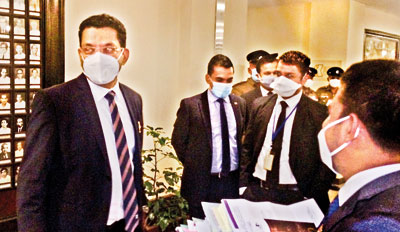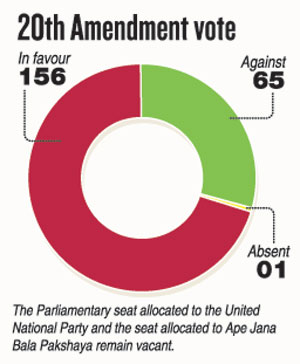Columns
After debate and deception, Govt. steamrolls 20A through parliament
With the backing of eight Opposition MPs, the 20th Amendment to the Constitution was passed in Parliament with 156 votes in favour and 65 against on Thursday night, giving a major victory for the Sri Lanka Podujana Peramuna (SLPP)-led ruling alliance and handing back President Gotabaya Rajapaksa many of the powers stripped from the presidency under the 19th Amendment.

By Sandun Jayawardana, our Lobby correspondent
The Opposition MPs who voted for the Amendment with the Government included Samagi Jana Balawegaya (SJB) Deputy Secretary and National List MP Diana Gamage. She was joined by seven SJB-led opposition MPs representing minority parties. They were: Ishak Rahuman (Anuradhapura District), Mohamed Harees and Faizal Cassim (Digamadulla District), M.S. Thowfeek (Trincomalee District), Naseer Ahamed (Batticaloa District ), Ali Sabri Raheem (Puttalam District) and Aravindh Kumar (Badulla District).
The Muslim MPs who voted for the amendment represent the Sri Lanka Muslim Congress and the All Ceylon Makkal Congress. Of the five SLMC MPs, only SLMC Leader Rauff Hakeem voted against the amendment.
During his debate speech, Mr Hakeem did reveal that some MPs from his party were in favour of voting for the amendment but urged them to reconsider their decision. This was confirmed towards the tail-end of the debate, when SLMC Batticaloa District MP Naseer Ahamed, who had been allocated time by the Government, got up and said the Opposition had denied him a chance to speak. He went on to praise President Gotabaya Rajapaksa and blamed the Yahapalana Government for allowing the persecution of Muslims following the Easter Sunday attacks.
Mr Ahamed’s speech provoked a furious reaction from SJB MPs, with several going near him and hurling insults. Winding up the debate on behalf of the Opposition, SJB National List MP Harin Fernando observed that the Government, which rode on the back of the Sinhala Buddhist vote, was now relying on Muslim MPs to ensure it obtained the two-thirds majority to pass 20A.
 It is uncertain whether the SJB-led opposition had prior-knowledge that as many as eight of its MPs would support 20A.
It is uncertain whether the SJB-led opposition had prior-knowledge that as many as eight of its MPs would support 20A.
In yet another stark exhibition of the treacherous nature of Sri Lankan politics, some SJB MPs who supported the amendment on Thursday had earlier sported red armbands distributed by the party with the inscription “No to 20A.” Yet they ultimately voted ‘Yes.’
The situation left plenty of egg on the faces of those in the SJB hierarchy, especially considering previous pronouncements that 20A will be easily defeated and how no one from their side would support such an amendment.
A separate vote was taken on the clause removing restrictions on dual citizens to enter Parliament. This too was passed with 157 votes in favour and 64 against. ACMC Digamadulla District MP S.M.M. Muszhaaraff, who voted against 20A, however, voted with the Government in favour of the dual citizenship clause.
Explaining his decision, Mr Muszhaaraff later told the Sunday Times he voted in favour of removing restrictions on dual citizens to become MPs since it was common knowledge that it had been included in 20A to allow former Minister Basil Rajapaksa to enter Parliament. “My party decided to vote against 20A and I did that. But Basil Rajapaksa is not a racist. He is well liked by the Muslim community because he supports them and knows how to develop the country. It is the Sinhala racists who oppose him being in Parliament. So, I thought of voting for this clause from a personal standpoint. It is not the view of my party,” he noted.
During the third reading of the Bill (Committee Stage), the Government not only introduced a number of amendments in accordance with the determination given by the Supreme Court, but also several more amendments proposed by the Government. The third reading too, was passed with 156 votes in favour and 65 against.
 Only former President and SLPP Polonnaruwa District Parliamentarian Maithripala Sirisena was absent at the time of the vote. Mr Sirisena was a vocal proponent of 19A and had long boasted how he was the only President who voluntarily gave up his powers. MPs from the Sri Lanka Freedom Party (SLFP), which Mr Sirisena heads, did vote in support of the amendment.
Only former President and SLPP Polonnaruwa District Parliamentarian Maithripala Sirisena was absent at the time of the vote. Mr Sirisena was a vocal proponent of 19A and had long boasted how he was the only President who voluntarily gave up his powers. MPs from the Sri Lanka Freedom Party (SLFP), which Mr Sirisena heads, did vote in support of the amendment.
From remand custody, All Ceylon Makkal Congress (ACMC) Leader Rishad Bathiudeen came to Parliament wearing Personal Protection Equipment (PPE). Parliament’s Serjeant-at-Arms had written to the Health Ministry Secretary, asking him to make arrangements to enable the MP to attend Parliament sessions. Mr Bathiudeen was provided a special seat in a corner in line with social distancing guidelines. He voted against the amendment.
President Gotabaya Rajapaksa, too, came to Parliament in the evening but did not come into the Chamber.
While it appeared all too easy in the end, in the days leading up to the two-day Parliamentary debate, the fate of 20A still hung in the balance, as some SLPP coalition partners raised objections to several clauses in the Bill, with the clause on lifting restrictions on dual citizens to contest elections becoming a serious bone of contention.
In the face of these protests both from within the Government and in civil society including religious leaders, the Cabinet this week took some decisions with regard to 20A. As such, clauses in the 19th Amendment regarding the composition of the Cabinet and the Audit Service Commission were retained. It was also agreed to limit the presentation of Urgent Bills to Parliament only to issues pertaining to national security and national disaster.
The dual citizen clause’s opponents including Minister Wimal Weerawansa, Vasudewa Nanayakkara and Tissa Vitharana, relented after a meeting with President Gotabaya Rajapaksa. They voted in support of the removal of the restriction after being assured by the President that the restriction would be reintroduced under a new Constitution which the Government says will come next year. Justice Minister Ali Sabry also assured this in Parliament when winding up the debate.
Now that 20A has been passed, the amendments made in the Committee Stage will be incorporated to the final amendment. It will then go to the Legal Draftsman for ratification and printed in the gazette afterwards. Speaker Mahinda Yapa Abeywardena will thereafter sign the gazette notification, making it into law.


Leave a Reply
Post Comment